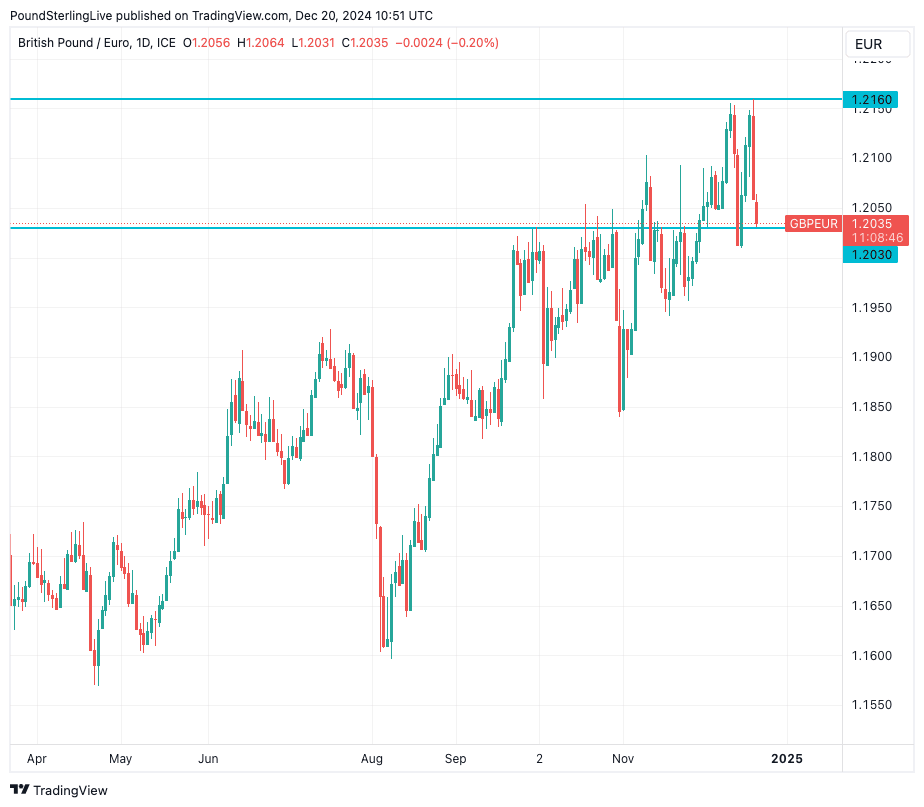
Image © Adobe Images
Pound Sterling is under pressure into the weekend, retreating from four-year highs against the Euro.
The Pound to Euro (GBP/EUR) exchange rate declined to a low at 1.2030 on Friday morning, pushed lower amidst the blowback from the previous day's Bank of England policy.
GBP/EUR hit its highest level in four years at 1.2160 in the lead-up to the Bank's decision to keep interest rates unchanged but signalled that it could accelerate the pace as it cuts interest rates in 2025.
This was the conclusion of financial market participants after three of the nine members of the Monetary Policy Committee (MPC) voted for an immediate cut, surprising a consensus expectation for an 8-1 split.
"The pound in under pressure after the Bank of England (BoE) left its Bank Rate unchanged at 4.75%, in line with expectations. The greater impulse for markets came from the fact that three officials voted for a cut, as opposed to the previous 8-1 split in favour of a hold. This sent a moderately dovish signal to markets, weighing on short-dated gilt yields and sterling," says George Vessey, FX Strategist at Convera.
Analysis from TD Securities says although investors have moderated their optimistic long GBP positioning, "it is still relatively long compared to non-USD peers leaving it vulnerable to further correction."
The pullback in Pound-Euro brings the conversion to a tentative graphical support area at 1.2030. The chart below shows that it is the approximated location of resistance during the September-November period:
"Sterling faltered from a four-year highs against the euro," says Kenneth Broux, a strategist at Société Générale. He says the decline from near 1.2060 came after three MPC members, not one, backed a 25bp rate cut at yesterday’s meeting.
"The dovish dissent was a surprise following stronger wages and inflation data earlier in the week. The BoE stuck to the mantra that a gradual approach to removing monetary policy restraint remains appropriate."
Most economists we follow think the Bank is keen to make the point that the market is underappreciating the number of rate cuts to come in 2025.
Ahead of the decision, money market pricing saw just two full 25bp rate cuts forthcoming in 2025, and it looks like the Bank wants to maintain a quarterly pace that would result in four more cuts.
Should market expectations move towards the Bank's preference, the Pound can come under some further pressure.
"Sterling will likely further decline as the BoE is set to resume easing next year," says Roberto Mialich, FX Strategist at UniCredit Bank.
Andrew Goodwin, Chief UK Economist at Oxford Economics, says the MPC still intends to cut rates more than markets anticipate in 2025.
"The scale of December's dovish dissent was greater than we had anticipated. Alan Taylor and Dave Ramsden joined Swati Dhingra in voting for a 25bps cut. While Taylor and Ramsden both made comments in mid-November that suggested they place relatively high weights on the most benign of the MPC's inflation scenarios, they stopped short of indicating they would vote for back-to-back rate cuts," he explains.
Also, five of the six members who voted to hold rates continued to back a "gradual approach to the withdrawal of policy restrictiveness" and indicated they are increasingly worried about the weakness in activity and employment.
Bank economists now expect zero GDP growth in 2024 Q4, which is weaker than the 0.3% incorporated into the November Report.
Further rate cuts are likely as the MPC reacts to a notable deceleration in UK economic growth rates and survey evidence suggesting rising unemployment.
Upside Still Favoured, Dips to be Shallow
Although the focus has been on Pound Sterling this week, the Eurozone's fundamentals are no better. In fact, the majority of analysts we follow see a difficult period ahead for the Euro.
A reminder of the challenges ahead was served by President-elect Donald Trump overnight when he urged Europe to buy more U.S. oil and gas or risk tariffs.
This will serve as a warning shot that tariffs are a notable risk to Eurozone economies.
With inflation more contained than in the UK, the ECB looks set to 'outcut' the Bank of England in 2025, which should keep the Euro under pressure against Sterling.
Although GBP/EUR is coming under near-term pressure, the multi-month prognosis remains constructive courtesy of the Eurozone's unfavourable comparisons with the UK.

